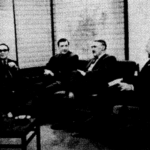English Philosophy in the Fifties
English Philosophy in the Fifties Jonathan Ree If you asked me when was the best time for philosophy in England in the twentieth century-for professional, academic philosophy, that is – I would answer: the fifties, without a doubt. And: the fifties, alas. * Under the leadership of Gilbert Ryle and f.L. Austin, the career philosophers […]

